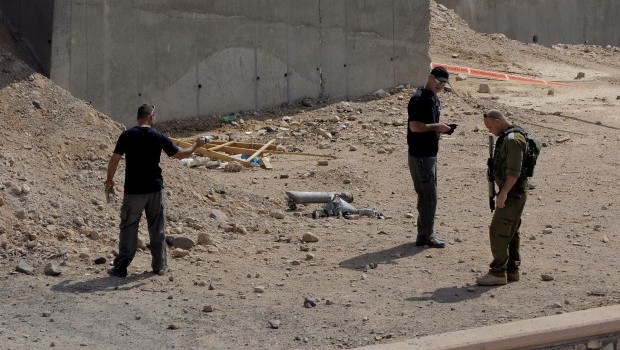
Israeli security investigates the scene of a rocket attack in Eilat, Israel, Wednesday, April 17, 2013. (AP)
According to the Israeli Army, the two explosions did not cause any casualties. The army also confirmed that the Iron Dome, which was built to intercept rockets such as these, did not detect the rockets fired at Eilat.
Meanwhile, an Israeli army official has declared that the two rockets were fired from Sinai. The Egyptian government has denied these claims, and its army has been ordered to investigate the Israeli version of events.
Jordan has also denied that the rockets were fired from its territories.
Speaking to Asharq Al-Awsat hours after the attacks, prominent Gaza Salafist leader Abu Al-Ayna Al-Ansari said that the rockets fired at Eilat are part of a “continuing jihad” against Israel. Ansari is not a member of the Mujahideen Shura Council.
He stated: “We will continue along this road. The jihad will not stop despite the pressures and threats or the many lying in wait for us.”
On the the relationship between Hamas and Salafi militant groups in the Gaza Strip, Ansari said: “They [Hamas] have political interests, but we have religious motivations so our actions are more justified. We will continue the jihad regardless of the stance of Hamas or Egypt.”
Hamas has not commented on the rocket attacks on Eilat.
Ansari denied that Salafi groups in the Gaza Strip continue their violent attacks due to their strained relationships with Egypt and Hamas, saying: “We do not act on political premises. The relationship with Hamas and Egypt does not guide us. We did not want to send messages to anyone. This is just jihad.”
Ansari accused Egypt and Hamas of coordination in the war against the Salafis. Referring to investigations carried out following an attack on Egyptian soldiers in Sinai last August, he said: “Many of the arrests in the Gaza Strip were done on Egyptian orders. We have precise information about full coordination between Egypt and Hamas in the war on the Salafis. Some of our mujahideen were arrested at the request of the Egyptians, and Egyptian security officers interrogated them in Gaza.”
There are more than 30 Salafi detainees in the dismissed government’s jails in Gaza who were arrested for firing rockets, Al-Ansari asserted.
Meanwhile, April 17 saw protests and demonstrations throughout the Palestinian territories to mark “Palestinian Prisoners’ Day” in support of Palestinian prisoners held in Israeli jails. Ismail Haniyeh, Hamas’ prime minister in Gaza, said in a Prisoners’ Day speech that “for our people and the resistance, all options are on the table to liberate our heroic prisoners.”
A spokesman for the Israeli prison administration, Sivan Weizman, confirmed that more than 3000 Palestinian prisoners had gone on hunger strike to mark the day.

Trackbacks/Pingbacks